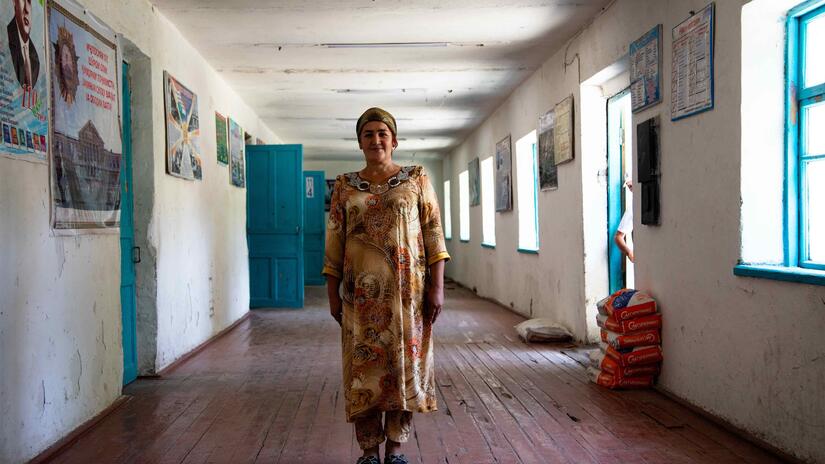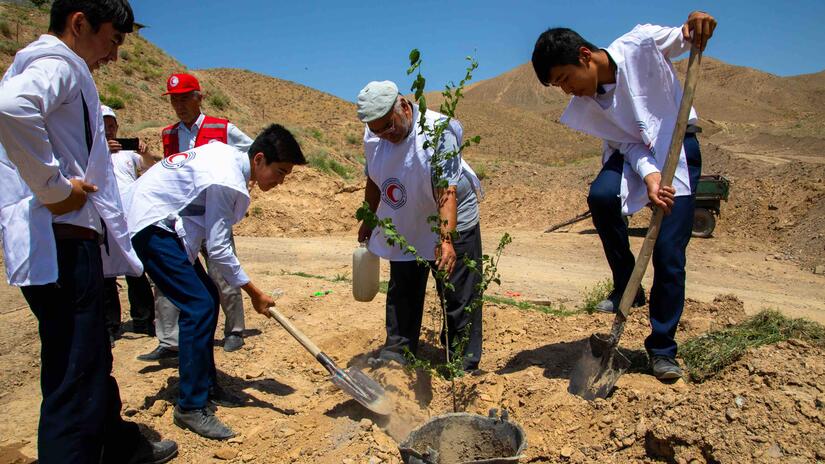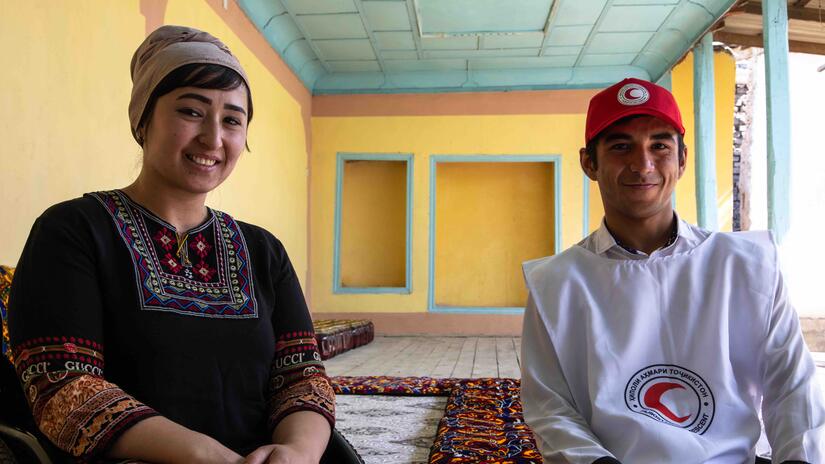Tajikistan: From landslides to landmines, partnership helps keep people safe and healthy
29/04/2024 |

An elementary school student in the village of Changal, in northwestern Tajikistan, is loaded into an ambulance as part of training on how to act during an earthquake. In a preparedness exercise organised by the Tajikistan Red Crescent, in cooperation with the Programmatic Partnership, students and staff learned how to leave classrooms quickly and give first aid to the injured.
Photo: Veera Lehto-Michaud / Finnish Red Cross
Tajikistan is prone to natural disasters such as mudflows, floods, landslides, earthquakes, avalanches, heat and cold waves. The increasing impact of climate change is exacerbating these hazards and the vulnerability of many rural communities.
Three kilometres from the Changal village school in Tajikistan lies a minefield. As the summer holidays approach, chemistry teacher Saida Meliboeva and other Tajikistan Red Crescent volunteers warn children to stay away from the danger zone in the border area between Tajikistan and Uzbekistan.
However, cattle are moving into the minefield and children and herding animals are in danger. No one knows exactly where the mines are, as they are not marked on the map. Frequent mudslides and floods move the mines to unpredictable locations.Information shared by the Tajikistan Red Crescent has helped keep children safe and it has been 15 years without any mine accidents.
This is just one of the many critical activities supported by a three-year partnership between IFRC and the EU is supporting local communities in Tajikistan to effectively anticipate, respond, and recover from the impact of multiple shocks and hazards.

Standing in the hallway of her school, chemistry teacher Saida Meliboeva explains how she and other Tajikistan Red Crescent volunteers warn children to stay away from landmines and other dangers in the border area between Tajikistan and Uzbekistan.
Photo: Veera Lehto-Michaud / Finnish Red Cross
Schoolchildren also learn how to act during an earthquake and other disasters and everyday accidents. In a preparedness exercise organised by the Tajikistan Red Crescent, students learned how to leave classrooms quickly and give first aid to the injured.
"Our teacher told us what to do in case of a mudslide or an earthquake, or what to do if someone breaks a bone or you need to give first aid," says Manija, a student from Panjakent in Tajikistan."If there is an earthquake, we find a place where there are no houses and sit there. We have to stay brave and calm and go out without rushing."
Tajikistan Red Crescent volunteer Azambek Dusyorov still remembers what the mudslide approaching his home in Panjakent, looked like. Spotting the mass of earth falling from the mountains, Azambek told his friends and family of the danger and ran for safety up the hill. Fortunately, the house remained standing.
Since then, Azambek and other Red Crescent volunteers have planted trees in the yard, the roots of which help keep the earth masses in place. A wide track has been cut into the hillside, allowing the mudslides to descend into the valley without destroying homes and crops.

Tajikistan Red Crescent volunteer Azambek Dusyorov (left, holding shovel) joins several other Tajikistan Red Crescent volunteers in planting trees so that their roots can help keep the earth masses in place and prevent the likelihood of landslides and mudslides.
Photo: Veera Lehto-Michaud / Finnish Red Cross
When clashes intensified along the border between Tajikistan and Kyrgystan, Red Crescent volunteer Abdurahmon Sultan began visiting homes in the region to make sure people know how to take care of themselves and their neighbors in case of an injury.
One of the homes he visited was that of Mashkhura Hamroboeva, in Khistevarz jamoat at Khujand. Since then, meetings have continued, and discussions have revolved around everyday topics. "We meet 2–3 times a month. We talk about everything from how to prevent frostbite in winter to how to avoid infectious diseases," says 17-year-old Abdurahmon.
It didn’t take long for Abdurahmon's advice to come in handy. When Mashkhura's three-year-old son accidentally spilled a hot cup of tea on himself, Mashkhura remembered what Abdurahmon had told her. Traditionally, a burn had been treated with a cut potato, but this time Mashkhura dipped the child's hand in cool water.

: Thanks to first-aid training from 17-year-old Red Crescent volunteer Abdurahmon Sultan (right), local resident and mother Mashkhura Hamroboeva (seated left) was able to quickly and correctly treat her three-year-old son after he spilled a hot cup of tea on himself.
Photo: Veera Lehto-Michaud / Finnish Red Cross
There are just some of the Tajikistan Red Crescent actions (supported by the Programmatic Partnership) that help people and communities prevent future catastrophies and take care of themselves during crises they weren’t able to prevent.
The Programmatic Partnership between the IFRC network and the European Union, provides strategic, flexible, long-term and predictable funding, so that National Societies can act before an emergency occurs. It is being implemented in 24 countries around the world.
29/04/2024 |

An elementary school student in the village of Changal, in northwestern Tajikistan, is loaded into an ambulance as part of training on how to act during an earthquake. In a preparedness exercise organised by the Tajikistan Red Crescent, in cooperation with the Programmatic Partnership, students and staff learned how to leave classrooms quickly and give first aid to the injured.
Photo: Veera Lehto-Michaud / Finnish Red Cross
Tajikistan is prone to natural disasters such as mudflows, floods, landslides, earthquakes, avalanches, heat and cold waves. The increasing impact of climate change is exacerbating these hazards and the vulnerability of many rural communities.
Three kilometres from the Changal village school in Tajikistan lies a minefield. As the summer holidays approach, chemistry teacher Saida Meliboeva and other Tajikistan Red Crescent volunteers warn children to stay away from the danger zone in the border area between Tajikistan and Uzbekistan.
However, cattle are moving into the minefield and children and herding animals are in danger. No one knows exactly where the mines are, as they are not marked on the map. Frequent mudslides and floods move the mines to unpredictable locations.Information shared by the Tajikistan Red Crescent has helped keep children safe and it has been 15 years without any mine accidents.
This is just one of the many critical activities supported by a three-year partnership between IFRC and the EU is supporting local communities in Tajikistan to effectively anticipate, respond, and recover from the impact of multiple shocks and hazards.

Standing in the hallway of her school, chemistry teacher Saida Meliboeva explains how she and other Tajikistan Red Crescent volunteers warn children to stay away from landmines and other dangers in the border area between Tajikistan and Uzbekistan.
Photo: Veera Lehto-Michaud / Finnish Red Cross
Schoolchildren also learn how to act during an earthquake and other disasters and everyday accidents. In a preparedness exercise organised by the Tajikistan Red Crescent, students learned how to leave classrooms quickly and give first aid to the injured.
"Our teacher told us what to do in case of a mudslide or an earthquake, or what to do if someone breaks a bone or you need to give first aid," says Manija, a student from Panjakent in Tajikistan."If there is an earthquake, we find a place where there are no houses and sit there. We have to stay brave and calm and go out without rushing."
Tajikistan Red Crescent volunteer Azambek Dusyorov still remembers what the mudslide approaching his home in Panjakent, looked like. Spotting the mass of earth falling from the mountains, Azambek told his friends and family of the danger and ran for safety up the hill. Fortunately, the house remained standing.
Since then, Azambek and other Red Crescent volunteers have planted trees in the yard, the roots of which help keep the earth masses in place. A wide track has been cut into the hillside, allowing the mudslides to descend into the valley without destroying homes and crops.

Tajikistan Red Crescent volunteer Azambek Dusyorov (left, holding shovel) joins several other Tajikistan Red Crescent volunteers in planting trees so that their roots can help keep the earth masses in place and prevent the likelihood of landslides and mudslides.
Photo: Veera Lehto-Michaud / Finnish Red Cross
When clashes intensified along the border between Tajikistan and Kyrgystan, Red Crescent volunteer Abdurahmon Sultan began visiting homes in the region to make sure people know how to take care of themselves and their neighbors in case of an injury.
One of the homes he visited was that of Mashkhura Hamroboeva, in Khistevarz jamoat at Khujand. Since then, meetings have continued, and discussions have revolved around everyday topics. "We meet 2–3 times a month. We talk about everything from how to prevent frostbite in winter to how to avoid infectious diseases," says 17-year-old Abdurahmon.
It didn’t take long for Abdurahmon's advice to come in handy. When Mashkhura's three-year-old son accidentally spilled a hot cup of tea on himself, Mashkhura remembered what Abdurahmon had told her. Traditionally, a burn had been treated with a cut potato, but this time Mashkhura dipped the child's hand in cool water.

: Thanks to first-aid training from 17-year-old Red Crescent volunteer Abdurahmon Sultan (right), local resident and mother Mashkhura Hamroboeva (seated left) was able to quickly and correctly treat her three-year-old son after he spilled a hot cup of tea on himself.
Photo: Veera Lehto-Michaud / Finnish Red Cross
There are just some of the Tajikistan Red Crescent actions (supported by the Programmatic Partnership) that help people and communities prevent future catastrophies and take care of themselves during crises they weren’t able to prevent.
The Programmatic Partnership between the IFRC network and the European Union, provides strategic, flexible, long-term and predictable funding, so that National Societies can act before an emergency occurs. It is being implemented in 24 countries around the world.
No comments:
Post a Comment